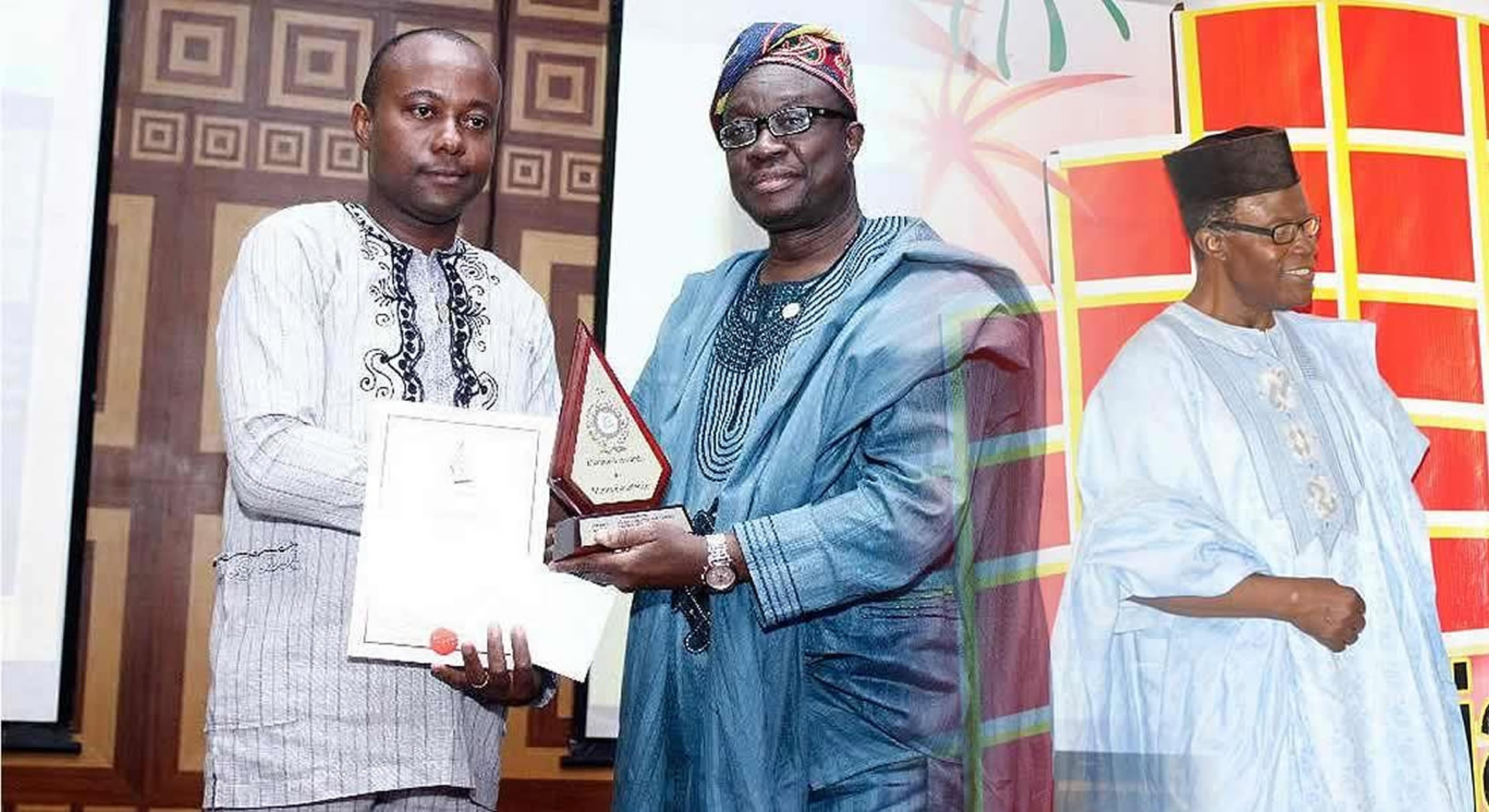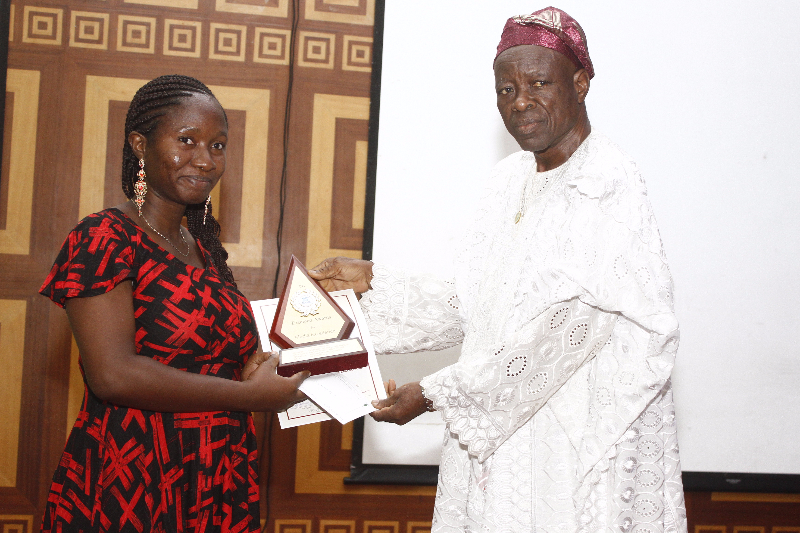DAME AWARDS
Hadj. Alade Odunewu
Tribute to Hadj. Alade Odunewu, recipient of the DAME Lifetime Achievement Award, 2007
R. I. P. Alade Odunewu, long live Allah de
By Lanre Idowu
Suddenly, the news hit us July 25; Hadj. Alade Odunewu, journalism’s gift to Nigeria, is no more. As a small measure of his worth, the media have been abuzz with stories of his passage. Tributes have been pouring in from all strata of the society—the media, politicians, academics, titled and untitled Nigerians, sincere patriots; and indeed court jesters for whom our lamented icon gave a wide berth in his lifetime. At his burial, July 26, the media was well represented by a good mix of the ancient and modern practitioners. Today, 8th day Fidau prayers will be offered for the repose of his soul.
His passage affords us the opportunity to examine what it was that endeared him to us. On a personal note, I have lost a mentor, who readily shared the gift of a rich and analytical mind. By his passage, my annual Sallah visits to some select Muslim faithful has declined by one. Gone is the familiar peering as he tried to understand your viewpoint, the shiny pate, the hearty laughter, and the quaint expressions. In Odunewu, Nigeria has lost a decent soul. In a land where Lilliputians masquerade as giants, Odunewu was a giant who had the common touch. His modesty, graceful airs, and rich mind earned him the confidence of the high and mighty, the low and vulnerable to whose causes he lent the weight of his craft. Six years ago, when he turned 80, I said of the Odunewu appeal:
“It is part of the measure of our self worth when we acknowledge goodness in others. In a nation acutely lacking in authentic heroes, it is always refreshing to find someone whose story is exemplary enough to examine and share with others. So collectively, we can say that society renews itself when it promotes positive values through the lives of its members who have worthy lessons to bequeath. As a professional, Odunewu is an enduring lesson in single-minded pursuit of an objective. Ever since he was in school in Lagos, Port Harcourt and Onitsha, he had been exposed to the writings of the late Dr. Nnamdi Azikiwe, who, through a chain of newspapers, was the leading public opinion moulder of the 40s and 50s. Odunewu’s elder brother, Mobolaji, was a journalist, who edited one of Azikiwe’s papers, The Eastern Nigerian Guardian. If young Alade’s interest in Journalism was kindled by the writings in the Zikist papers, his career pursuit was guided by his brother. Journalism was good path to fame and public service. Odunewu was already familiar with the writings of Anthony Enahoro and Ebenezer Williams and it is fair to say alongside the duo of Azikiwe and Mobolaji, the quartet shaped Odunewu’s initial journalistic steps.
He was one of the earliest Nigerians to receive formal training in Journalism as he secured a Government scholarship to study Journalism at Regent Polytechnic (now University of Westminster). Alongside obtaining his diploma in Journalism, he also won the New Statesman prize for Best-all-round-student. His career began at the Daily Times in 1950 when he was recruited as a reporter. He later moved to the Tribune as editor/managing editor, 1956-57; Daily Service as editor, 1959-60; Allied Newspapers as editor-in-chief, 1960-64. He was Sunday Times editor in 1964, before being uplifted as the Daily Times editor, 1964-68 and editor-in-chief, 1968-69. He later served as CEO of the publications division. So it can be said that Odunewu has held all the important positions in journalism: reporter, sub editor, editor, columnist, editor-in-chief and CEO. He has also held some of the most challenging public communications assignments: Commissioner of Information, Tourism and Culture in Lagos state, Public Complaints Commissioner and Electoral Commissioner at the national level. His achievements in both worlds were commendable. Odunewu’s voice of wisdom from his columns in various newspapers from the 60s to as recent as 2004 rings loud again in his re-launched book, Winners take all.”
Hadj. Odunewu’s strength as a journalist lay in his intellectual depth, elegant wit, biting sarcasm and disarming simplicity of language. Until death, “the arrogant intruder that rides on every passing breeze,” called, he remained not only a respected name in the industry but also an actor in the continuous search for journalistic excellence and responsibility. Well after retiring, he served as chairman of the Nigerian Press Council for a decade, giving it some garb of respectability. That the federal government remains unclear about what to do with the Press Council accounts for the decline in its fortunes today, leaving it open to relentless assault from the organised media. Odunewu’s passage may well serve as an opportunity to re-examine the two contending models–a statutory press council favoured by government and the independent ombudsman mechanism, initiated by the media–to mediate between the media and the public in the inevitable brushes that characterise their relationships.
He also lent his name and stature to the pursuit of that which is noble, fair and just in our profession. Sponsor of the Informed Commentary category of the Diamond Awards for Media Excellence (D.A.M.E.) since inception in 1992, he served as chairman of the Nigerian Media Merit Awards (NMMA), where he appropriately also sponsored the Best Columnist of the year prize since 2006. Both award schemes have made unparalleled private sector contributions to the conscious effort to enhance professionalism in the media. In 2007, Odunewu acknowledged the awards have impacted heavily on Journalism practice. ‘‘People are now conscious of the fact that they are being looked at; competition is getting keener by the year. Quite a good number of awardees have gone to greener pasture and have done the profession and country proud. We must commend those behind these noble ideas.’’
Beyond the top media jobs he held, Odunewu enjoyed the institutional recognition of the media. This ranged from the Nigeria Union of Journalists to the Nigerian Guild of Editors of which he was a past president, to the Newspaper Proprietors’ Association of Nigeria, to a training school like the Nigerian Institute of Journalism, to the 1999 industry-led initiative of late Tunji Oseni where he was named one of the 14 icons of Journalism development in 140 years of Nigerian Journalism, to D.A.M.E. and Thisday which honoured him with Lifetime Achievement awards. On July 19, 2011, Diamond Publications, with support from the Press Council, presented a major book, Nigerian Columnists and their Art, which I edited, in his honour. A worthy addition to Journalism literature, contributors to it include: Adidi Uyo, Mike Awoyinfa, Ben Lawrence, Felix Adenaike, Tony Momoh, Dan Agbese, Gbenga Omotoso, Sunny Obazu-Ojeagbase, Stanley Egbochuku, and Maxim Uzoatu. It also features samples of the writings of such columnists as late Olabisi Onabanjo, Peter Enahoro, Abiodun Aloba, Alade Odunewu, Sam Amuka, Gbolabo Ogunsanwo, Tunji Oseni, Ray Ekpu, Stanley Macebuh, Olatunji Dare, Adebayo Williams, Odia Ofeimun, Reuben Abati, Ochereome Nnanna, Tunde Fagbenle, Azu Ishiekwene, Pini Jason, Ijeoma Nwogwugwu, Doyin Abiola, Dele Omotunde, Muhammed Haruna, and Sam Omatseye.
That work, alongside his own published work, Winners take all, should serve as worthy tributes to the craft of informed commentary and remind some of our emerging writers that literary grandstanding or egoistic vituperation is not. That way, even as Alade Odunewu has gone the way of all flesh, Allah de would still be around.
May the heavens accept his soul!
-Lanre Idowu, August 1, 2013
e-Book Download in PDF

Please click here to download the e-Book for "Watchdogs or Captured Media" book that was recently launched.

